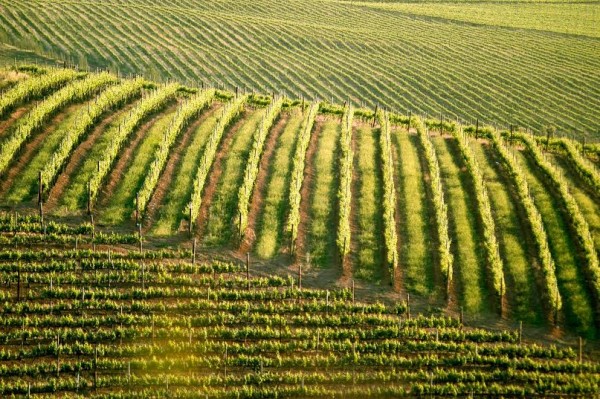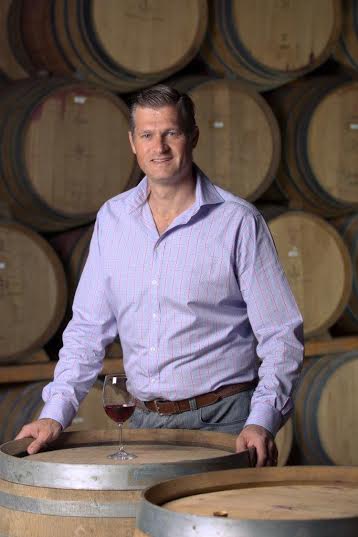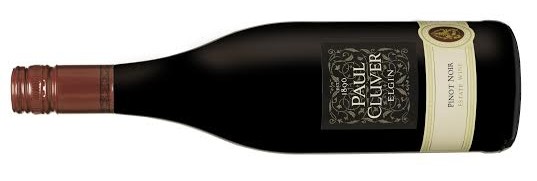The Elgin Wine Valley confirmed its reputation as the Western Cape’s home of cool climate wines by largely escaping the effects of heat and drought which hampered a large part of the South African wine industry during this year’s harvest. According to Andries Burger, cellarmaster at Paul Cluver Wines, the spring and early summer growing seasons were warmer than average with day-time temperatures in the early 30°C’s, but the Valley’s cool nights ensure healthy grapes without any heat damage.
“The warmer growing season saw the harvest teams in the vineyards on 28 January, the earliest ever at Paul Cluver Wines,” says Burger who this year celebrates his 20th year as cellarmaster at the pioneering Elgin wine estate renowned for its Pinot Noir, Chardonnay, Sauvignon Blanc and Riesling wines.
“At the height of summer – end January to middle February – we had consistent days at just over 30°C which would fall to around 8°C at night-time. Although the night temperatures during this time were slightly higher than the long-term norm, we still recorded an average of 10°C difference between day and night temperatures. The fact that we begin harvesting at 01:00 means that the grapes start coming in at their freshest and subsequently the young wines of 2016 are showing the true cool-climate quality I am familiar with after two decades at Paul Cluver.”
The warmer growing season led to vines flowering earlier than usual, with a very short, compact period of veraison. “One result of the consistently above-average temperatures are seen in the grape bunches which are very compact, but with patches of uneven ripening which are removed during the winery’s meticulous process of hand-sorting,” says Burger.
Lower fruit acidity is a feature of a warmer season, and here Burger says the Paul Cluver team had to be smart in their timing of when to pick. Extensive drop-out calculations had to be done on each vineyard block before harvesting to calculate how much acidity would be lost during vinification.
“Being a cool climate wine region, freshness is an expected characteristic in all our wines and for this acid-to-pH ratio is king,” he says. “Especially in the Sauvignon Blanc we picked at the lower degree of ripeness to ensure enough acidity for that precise freshness. The resulting young wines are absolutely superb with true Elgin character.”
Yields are healthy too, with Burger expecting the season to finish with the Paul Cluver winery taking in just over 700t of grapes – slightly more than average.
“Bunches are bigger, but with smaller berries,” says Burger, “a result of Elgin’s long wind-free spring and summer which meant flowering and berry-set took place in an uncharacteristically still environment.”
The condition of the fermenting must and young wines in the cellar is healthy, balanced and expressive of Paul Cluver’s vineyards.
“As pioneers of viticulture in Elgin, our entire philosophy is built around making wines that reflect the unique natural environment and our distinct sites,” says Burger. “If you don’t get it right in the vineyards, I can’t really correct things in the cellar.”
Using wild fermentation on Chardonnay, the wines’ development has been controlled and even with no spikes in temperatures as sugar changes to alcohol or stuck ferments. “They are just fermenting away – anything between four to ten weeks as nature takes its course,” says Burger.
The heartbreak grape, Pinot Noir, is causing a few cardiac flutters among Burger and his colleagues.
“The smaller berries have given the 2016 wines brilliant colours, and fermentation and colour extraction have been clean resulting in pureness of fruit which is difficult not to get excited about, even at such an early age,” he says.
Riesling, of which Paul Cluver is South Africa’s largest estate producer, underwent a slightly different process in the cellar than usual.
“I usually give the Riesling a few hours on the skin during fermentation, this year we will limit this practice, mainly to retain as much as possible the natural acidity which is such an important part of Riesling. Secondly due to the warmer weather there could be more carotenoids in the grapes which is a precursor to the formation of the terpene-like characters in Riesling,” says Burger. “The juice was thus pulled off almost immediately in order to retain the freshness of classical Riesling.”
And on his 20th harvest at the helm of Paul Cluver Wines?
“Butterflies each day from nervousness, anticipation and excitement,” says Burger. “I have had those butterflies since my first day in the winery and will have them until my last. It is just a magical time for a winemaker.”






